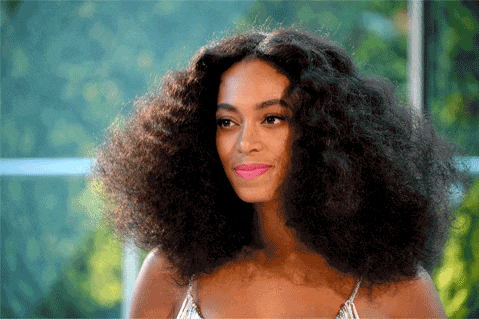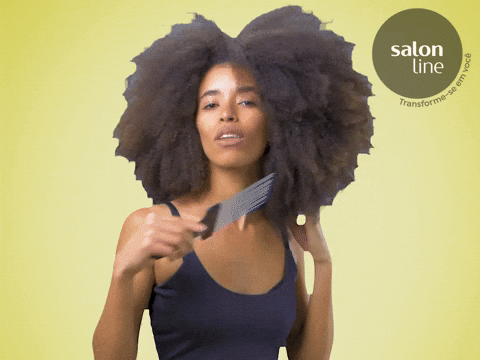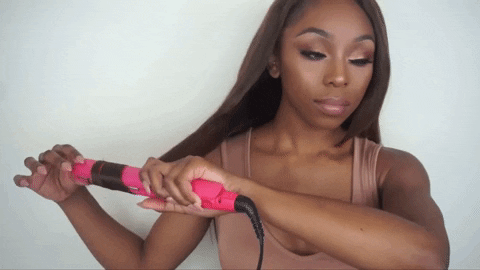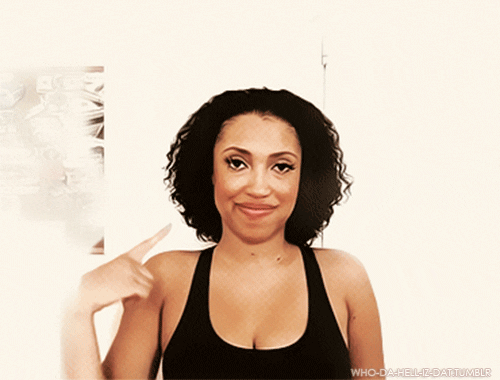Black Minimalists Share What They Stopped Buying In Order To Live Their Best Lives
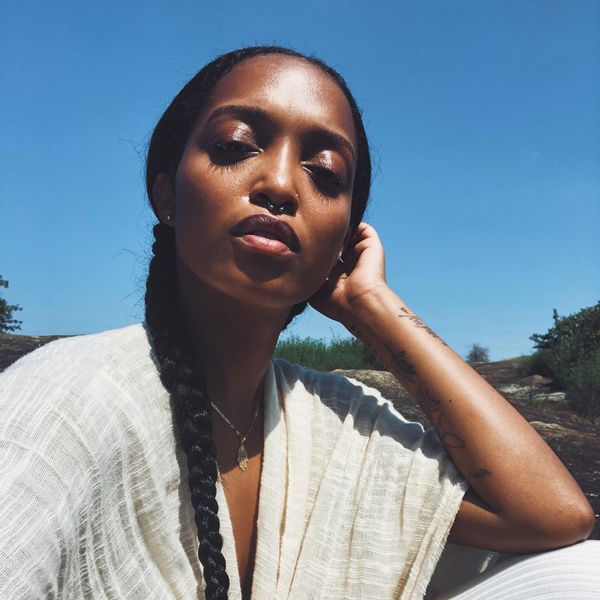
What does it really mean to "have everything"? I suppose it depends on what you define as everything. From achieving your goals to living the life you didn't have as a child to living unapologetically, having everything isn't always qualified and quantified by material things. This way of thinking is related to the minimalist lifestyle – an existence that is rooted in happiness when living with less.
For minimalists, they value experiences over possessions.
Minimalism is not for the faint of heart. The 'less is more' concept is one that requires discipline, consistency, and intention. We have watched as the minimalist theory swept across varying fields from fashion to interior design to photography. It is such a beautiful way of life, and we are in awe of how Black women apply the theory to their lives.
So, we talked with four Black women who aren't new to minimalism; they are true to minimalism. Keep reading for why they made the choice, how their upbringing affected their decision, and their advice for other women.
Editor's Note: This story was originally published in 2021 and is being republished for its continued relevance. The journeys shared below reflect the women's perspectives at the time.
Whitney Roberts
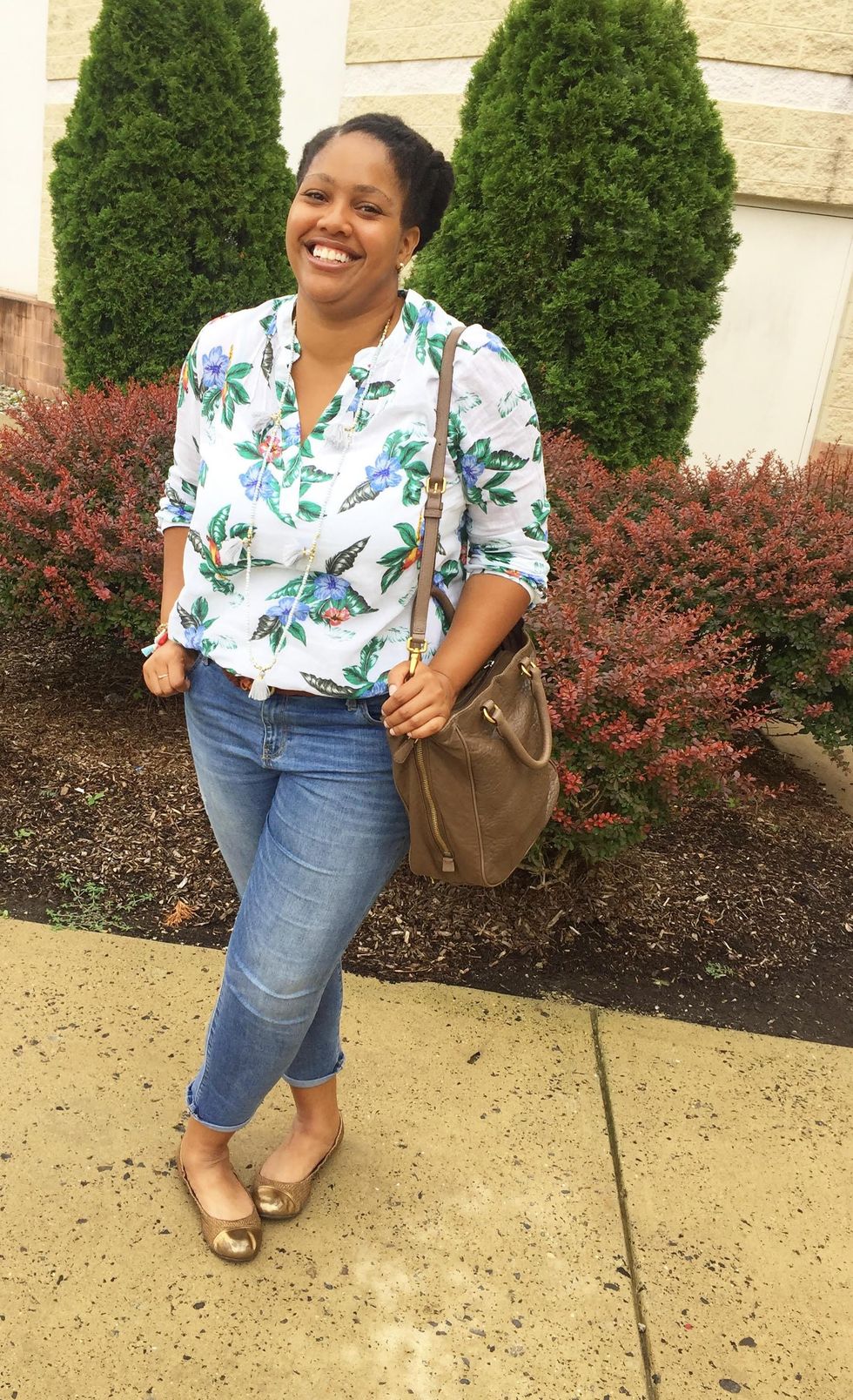
Courtesy of Whitney Roberts
When did you adapt to the minimalist lifestyle?
I have been a minimalist for about four years now. I adopted minimalism because I was honestly tired of stuff. As a writer, I find clutter to be distracting. To keep me as focused as possible, I try to eliminate as much of it as possible.
What was the hardest obstacle in making this change?
Getting rid of certain things. For me, clothes were easy to clear out as I made the practice of clearing my wardrobe every season change in order to donate. The most difficult things to get rid of were my books! I love to read and managed to get my hands on many rare copies.
How did your upbringing affect your choice to become a minimalist?
Majorly! My mom is big on giving things away that we aren't using. She's really generous. I would like to think I inherited her generosity. On the other hand, one of my grandparents was a huge hoarder. They would buy things just to have them and wouldn't share. I saw how that affected their lives and how, in the end, all they had was their stuff.
What things did you stop buying in order to feel freer financially?
CLOTHES! I said earlier how easy they were to give away and unless I need something, I rarely shop for clothes. And you will be surprised how quickly the savings add up when you're not constantly shopping for things that are in style today and out tomorrow.
Can you share your biggest joy since you made the modifications?
The biggest joy is handing over that box of things I don't need knowing that they are going to people who do need them. I recently cleared some gently-used dishes I didn't need and, afterward, found a family that didn't have any. Handing them that box and sharing in that moment of gratitude (them grateful for the dishes and me grateful to help) was a big joy.
What advice do you have for women wanting to live life minimally?
Start small. You don't have to reduce all of your items in one day, or even in one month! Take your time. Choose one area at a time. Go through each item, one at a time, and ask yourself if you really NEED it or not. It's totally doable. Just go at your own pace.
For more of Whitney, follow her on Instagram.
Danae Smith
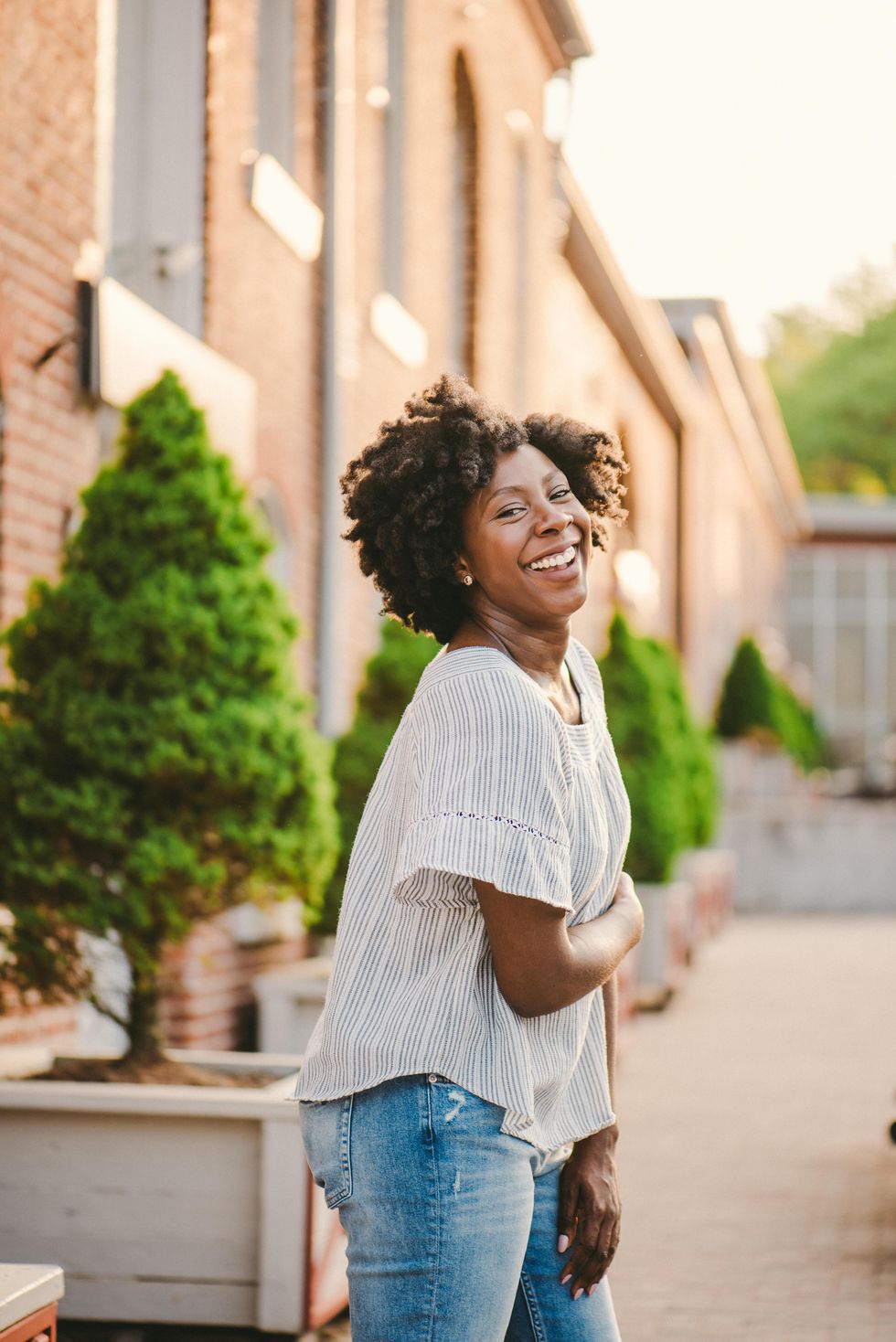
Courtesy of Danae Smith
When did you adapt to the minimalist lifestyle?
I started my minimalist journey in 2015 but in the last couple of years, I've really leaned into the slowness and simplicity of minimalism.
What was the hardest obstacle in making this change?
The hardest obstacle was unlearning rushing and learning to let go. Decluttering spaces wasn't too hard. I could easily let go of clothes and shoes that didn't spark joy, but for me, it was hard to let go of items that held memories. It's a process, but minimalism has challenged my need to hold on to all the things, be that something tangible or intangible. As for unlearning rushing, embracing minimalism has and continues to challenge my need to rush on to the next thing, be that a trend or literally how I move from one space to the next.
I'm constantly learning to slow down and be still, to give the moment in front of me my full attention.
"I'm constantly learning to slow down and be still, to give the moment in front of me my full attention."
How did your upbringing affect your choice to become a minimalist?
I didn't grow up in a minimalistic home, but I did grow up in a home that valued delayed gratification, imaginative play, and reading over television, etc. I grew up in a home that did not follow trends a ton and that has deeply impacted how I move through life now. In some ways, the way I grew up helped make the adjustment to a more minimalist lifestyle a little easier.
What things did you stop buying in order to feel freer financially?
I think the first items to receive a personal budget cut were clothes and shoes. Nowadays, I aim to purchase clothing items that are aesthetically pleasing and functional with the ability to be worn in multiple seasons and styled differently each time. Doing the 10x10 challenge really helped me to get creative with the clothes I already owned. I also worked really hard at not eating out a ton, especially for lunch. I worked in D.C. for a while so it was easy to go to a food truck or chain restaurant to grab lunch. Of course, as with any journey, some days were definitely easier than others.
Can you share your biggest joy since you made the modifications?
My biggest joy has been giving myself permission to slow down and be fully present in a given moment.
What advice do you have for women wanting to live life minimally?
Don't feel pressured to pursue minimalism in any particular way. You don't have to suddenly don neutral tones or have a home barely furnished. You can pursue minimalism in full color with a cozy living space or whatever your vibe is. In my eyes, minimalism isn't just an aesthetic. It's a lifestyle choice that makes room for what matters and what you value. How that looks and unfolds in your life can and will look different from the next person.
For more of Danae, follow her on Instagram.
Jaznel Mosby aka J. Chavae or Jaz
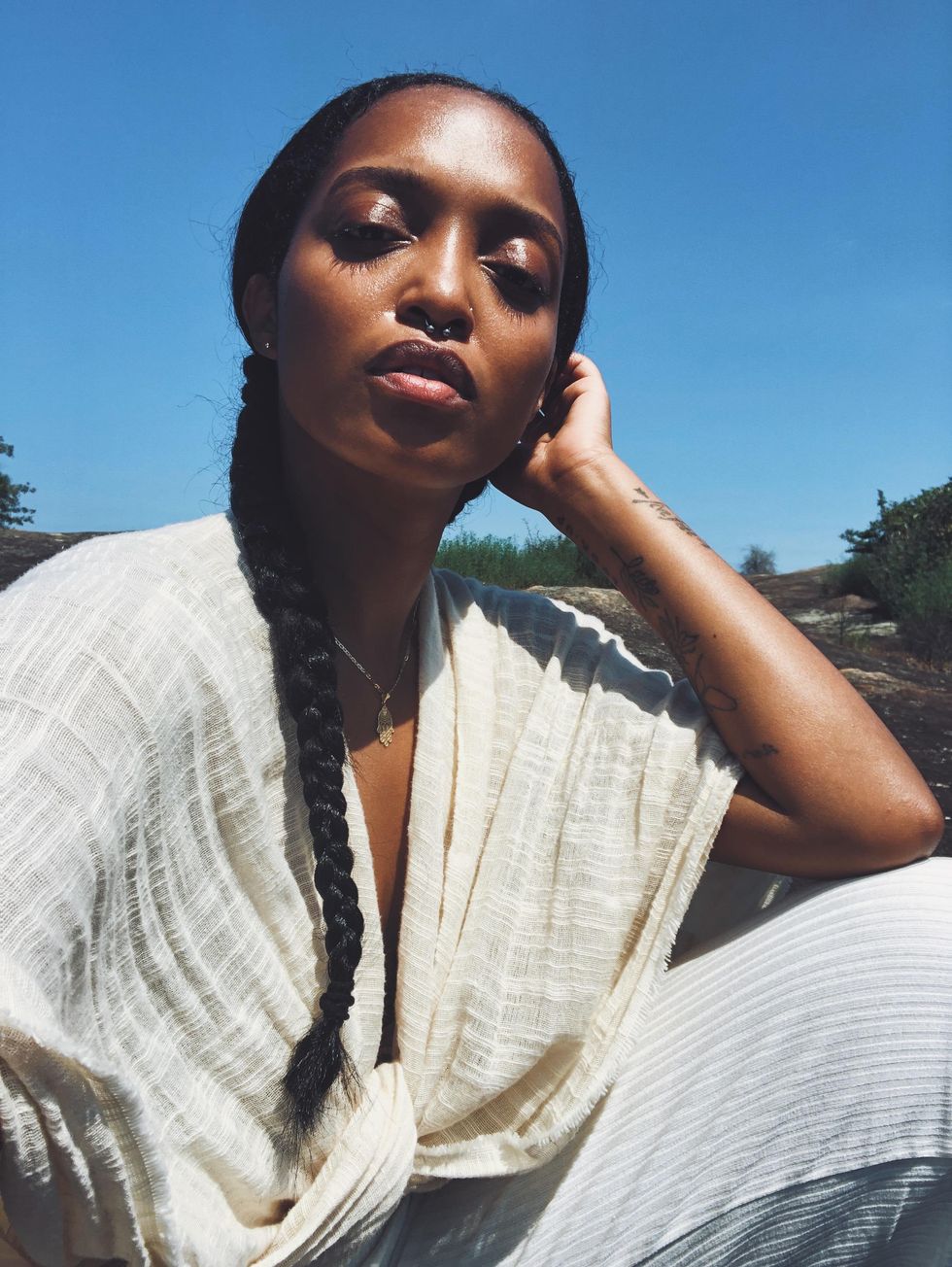
Courtesy of Jaznel Mosby
When did you adapt to the minimalist lifestyle?
I adapted to the minimalist, more so essentialist, lifestyle about four to five years ago.
What was the hardest obstacle in making this change?
The hardest obstacle in making this change was thinking that I had to have five to 10 items in my possession when in reality, it was being conscious of what I needed and what truly made me happy.
How did your upbringing affect your choice to become a minimalist?
Growing up, my mother had so many random things in high volume that she didn't need or use, be it shoes, food, cups, etc. I knew that it was because of a lack mentality (she grew up pretty poor in Jamaica) so I did have sympathy for her, but it drove me NUTS! I became obsessed with organizing first, then minimalism/essentialism was introduced to me and the game changed!
What things did you stop buying in order to feel freer financially?
I had to stop buying clothes and shoes. I was a real shopaholic in my early 20's, buying things for their photo potential regardless of wearability or comfort, but minimalism helped me kick that to the curb. I would always tell myself that I didn't have money when in reality, I did have money, I was spending it all on shoes, clothes, and FOOD.
Can you share your biggest joy since you made the modifications?
My biggest joy since this lifestyle change has been filling my home with things that I absolutely need and that I absolutely LOVE. Everything has a purpose and a place which makes my compartmentalized mind very happy!
What advice do you have for women wanting to live life minimally?
The advice that I would give to women wanting to live minimally or essentially is to add before you subtract. It's like wanting to be healthier. If you cut everything out, you're going to crave it more often and probably give in...the same applied to me when it came to my things. Figure out what you love and what you need, incorporate those items in your life and then give thanks to what you don't need or love (think Marie Kondo-style).
I also released things much easier when I gave them to someone I knew/loved. It made me happy knowing that they would use something that was simply taking up space in my home!
For more of Jaznel, follow her on Instagram.
Christine Platt
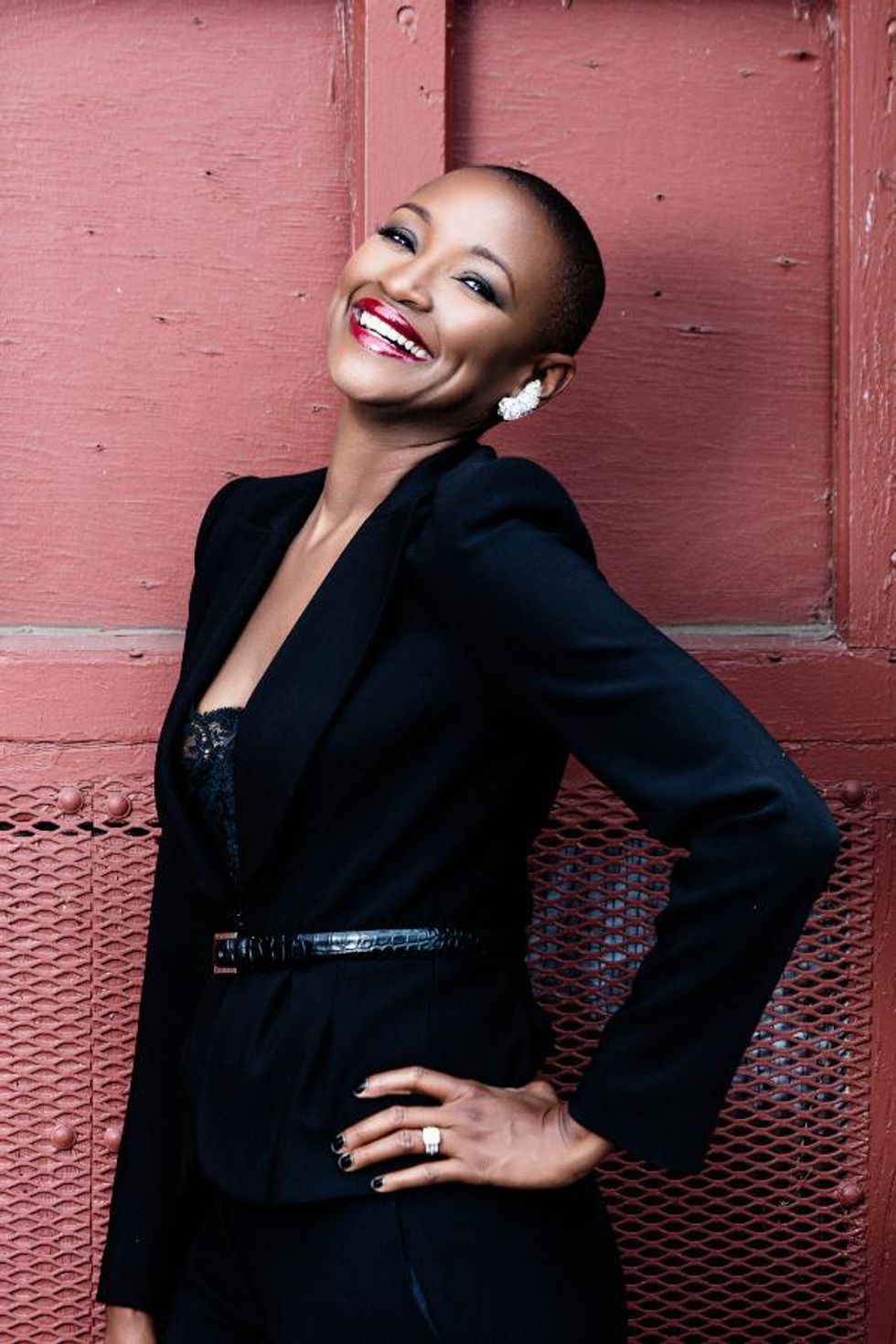
Courtesy of Christine Platt
When did you adapt to the minimalist lifestyle?
I began adapting a minimalist lifestyle in the summer of 2016 but in all honesty, I had no idea what I was doing. I was so focused on trying to mirror the neutral, barren aesthetics I saw online. It wasn't until 2017 when I began focusing on being authentic and intentional with my personal style that I truly began adapting to a minimalist lifestyle. For me, that looks like Afrominimalism—a home and wardrobe that reflects the history and beauty of the African diaspora.
The shift to being authentic and intentional was so pivotal! It is what led me to write The Afrominimalist's Guide to Living Less, to really encourage more people, especially Black people, to embrace the practice of minimalism more holistically. Being a conscious consumer has more benefits than having a tidy house and benefiting the environment. It is an opportunity for our community to use their resources to build generational wealth—and for many of us, we are the first people in our families to have the opportunity to do so.
What was the hardest obstacle in making this change?
The hardest obstacle wasn't sorting through everything to decide what I wanted to keep and what I wanted to let go (which is what I thought would be the hardest part). I was very surprised at the emotional work that came with the letting go process. I had to acknowledge what aspects of my childhood led to my excessive spending. I had to acknowledge that I had so many things but so little savings. And I had to forgive myself for all the decisions and choices that led to my overindulgence.
But ironically, I believe emotional labor is one of the most important parts of the process. Honoring my feelings has been essential to maintaining a lifestyle with less. And I really encourage anyone who is planning to or in the process of decluttering to embrace the anger, frustration, sadness, tears, and whatever other emotions emerge. It is important to first know the reasons why you have more than you need, and then honor the emotions that come with that understanding. If not, it is likely that you will continue the same spending habits and find yourself in the same situation again.
"Honoring my feelings has been essential to maintaining a lifestyle with less."
How did your upbringing affect your choice to become a minimalist?
I am so glad that you asked this question! How we were raised plays an important role in why so many people have more than they need. From how we saw our caregivers handle money to fulfilling unmet childhood expectations, there are aspects from our past that have influenced our relationship with money and spending habits. When I was younger, my mother and I spent the weekends shopping, and it was always my favorite part of the week. We had so much fun together! And so, I associated shopping with fun, with rewarding myself, with enjoying the fruits of my labor.
When I began adapting a minimalist lifestyle, I realized what a significant role my childhood played in my emotional spending, as well as the cultural influences and other aspects of my identity, such as being a first-generation everything. I have since become very intentional about breaking that cycle with my daughter and sharing my experiences with others so they can learn from my experiences.
What things did you stop buying in order to feel freer financially?
Okay, I want to address a misconception about minimalists—we buy things all the time! We are just 1) very very intentional about what we purchase and 2) constantly letting go of things that no longer serve us to make space for what matters. In order to be financially freer, I had to learn the reason behind my excess (the mindless consumerism and bargain shopping), and refrain from those behaviors. It's how I came up with a mantra that I sometimes still must use when I am shopping: "Remember, it's not a deal if you don't need it."
Can you share your biggest joy since you made the modifications?
Oh, my goodness! There is so much joy! Having savings is such a big part of my joy. Understanding my power as a conscious consumer and investing in my community. There is such joy in being intentional with where and how I spend my money.
What advice do you have for women wanting to live life minimally?
You know, I recently read this beautiful interview in ELLE with Taylour Paige who plays Dussie in Ma Rainey's Black Bottom (which the historian and lover of Black storytelling in me is just obsessed with that movie. Just, gah!) It just felt like I was having a conversation with a young Black woman on her way to understanding and seizing every opportunity in her lifetime. One thing that Taylour said really struck me: "We're all eternal. And this is just a blip in eternity. But if I can be conscious of that, why do anything I don't want to do?"
If you want to live more minimally, do it! And be fully conscious of and committed to your decision. And don't be afraid to make it your own. For me, it's Afrominimalism. But for you, it may be something entirely different. Think of minimalism as intentionalism. Be intentional about creating the life you want to live.
For more of Christine, follow her on Instagram.
Let’s make things inbox official! Sign up for the xoNecole newsletter for love, wellness, career, and exclusive content delivered straight to your inbox.
Featured image courtesy
Originally published on January 15, 2021
- 6 Life Hacks To Feel Like Money While You Save It - xoNecole ... ›
- 10 Minimalist Hacks That Will Save You Money - xoNecole ... ›
- How To Make The Transition To Van Life - xoNecole: Women's ... ›
- Practical Ways A Minimalist Lifestyle Frees Your Mind & Your Money ›
- Decluttering Tips, Marie Konda Netflix Organizing - xoNecole: Women's Interest, Love, Wellness, Beauty ›
This Is How To Keep 'Holiday Season Stress' From Infecting Your Relationship
Hmph. Maybe it’s just me, but it seems like there is something really weird happening in the fall season air (because winter doesn’t officially begin until December 21) that cuddle season is in full swing while break-up season is as well. In fact, did you know that break-ups are so popular during the holiday season that December 11 is deemed Break-Up Day?
The reasons why relationships shift around this time vary; however, I did both roll my eyes and chuckle when I read that a very popular one is because it’s an easy way to get out of getting one’s significant other a Christmas present. SMDH.
Anyway, I personally think that the less shallow folks out here may contemplate calling things “quits” or they at least distance themselves a bit from their partner (and what I’m referring to is serious relationships) due to all of the stress and strain that oftentimes comes with the holidays whether it be financial, familial, due to their tight schedules or something else.
Listen, I would hate for you and your man to miss the fun and happiness of experiencing this time of year, all because you are so overwhelmed or irritated that you can’t really enjoy it. That’s why I have a few practical tips for how to avoid allowing the typical holiday season stress from INFECTING your relationship.
Manage Your Expectations
 Giphy
GiphyUnmanaged expectations. If there is a main reason why the holiday season tends to be so stress-filled for so many people, I’d bet good money that this is the cause. And when you’re in a long-term relationship, expectations can manifest themselves in all sorts of cryptic and/or unexpected ways. You might have relatives who assume that you are going to be with them for Thanksgiving or Christmas when you have other plans in mind. You might be thinking that you are going to spend one amount for presents while your man is thinking something totally different. When it comes to scheduling, your signals may be crossed.
And you know what? To all of these scenarios, this is where clear and consistent communication come in. Don’t assume anything. Don’t dictate anything either. From now until New Year’s, mutually decide to check in once a week, just to make sure that you are both on the same page as it relates to the holidays and what you both are thinking will come along with it. The less blindsided you both feel, the less stressed out you will be. Trust me on this.
Set (and Keep) a Budget
 Giphy
GiphyOkay, so I read that last year, 36 percent of Americans incurred some type of holiday-related debt. Hmph. Last year, there was still some sense of normalcy in this country, chile, so I can only imagine what finances are gonna look like over the next several weeks. That said, since I don’t know a lot of people who don’t find being broke stressful, make sure that you and your bae set a budget and then stick to it this year — no ifs, ands or buts.
Because really, y’all — it doesn’t make sense to deplete savings and/or max out credit cards for a few days of giggles only to be damn near losing your mind because you don’t know how to make ends meet come Dr. Martin Luther King, Jr. Day.
And by the way, this tip doesn’t just speak to things like food and gifts; I also mean travel. If it doesn’t make a ton of sense (or cents) to be all over the place this year — DON’T BE.
Keep Matthew 5:37 at the Forefront
 Giphy
GiphyIf off the top of your head, you don’t know what Matthew 5:37 says, no worries, here ya go: “But let your ‘Yes’ be ‘Yes,’ and your ‘No,’ ‘No.’ For whatever is more than these is from the evil one.” That verse right there? Oh, it’s a boundaries lifesaver! I say that because do you see “maybe” or “I’ll think about it” in there? Nope. LOL. It says that you should tell people “yes” or “no” and leave it at that — and that complements Anne Lamott’s quote, “’No’ is a complete sentence” impeccably well. Yeah, you’ve got to remember that anything beyond a yes or no to a request is privileged information; you don’t owe anyone details or an explanation.
Besides, if you are really honest with yourself, when someone asks you something and you give a “Umm, let me think about it” kind of reply, more times than not, you already know what your answer is going to be — so why not let you both off of the hook? Give your response. Commit to that. And let everyone (including yourself) get on with their lives and schedules.
I promise you that when it comes to those holiday parties, you are pissing more folks off by not RSVP’ing or doing so and not showing up than just saying, “Thank you but not this year” off the rip.
Remember That Your Personal Space Is Privilege Not a Right
 Giphy
GiphyA friend of mine recently bought a new house and invited me over to come see it. He’s a single man with no children, so as I was taking in all of the space that he had, especially as I walked through his finished basement, I joked about relatives coming to live with him. “Hell no” and “absolutely not” were pretty much his immediate responses as he went on to say that some folks even had the nerve to be offended when he told them that he had no intentions on taking DNA in.
Ain’t it wild how people think that your stuff is their right? And yes, that brings me to my next point. Your home is your sanctuary space. If you want to host folks this year — cool. If not, ALSO COOL. Please don’t let folks (family included) guilt you into how they want you to act or even into what they would do if the shoe was on the other foot. You are not them — and as one of my favorite quotes states, “If two people were exactly alike, one of them would be unnecessary.” (A man by the name Larry Dixon said that.)
Hell, my friends? They know that I am good for sending them random things that they need or even want all throughout the year. Coming over to hang out at my pace, though. Uh-uh. Chalk it up to being a card-carrying member of the ambivert club yet I like keeping my living space personal — and I sleep like a baby, each and every night, for feeling that way.
Always remember that your space, your time, your resources, your energy and shoot, yourself period (including your relationship), are all things that are your own. You get to choose how, when and why you want to share them. The holiday season is certainly no exception.
Cultivate Some “You Two Only” Traditions
 Giphy
GiphyIt’s not uncommon for some couples to hit me up after the holiday season to “detox.” Sometimes it’s due to the financial drama (and sometimes trauma) that they experienced. Sometimes it’s because they allowed their relatives (especially in-laws) to get more into their personal business than they should’ve. More than anything, though, it tends to be because they didn’t get enough quality time together and so ended up feeling “disconnected.”
Please don’t let that happen. Listen, I’m not even a holidays kind of woman and yet, I will absolutely sit myself down with some hot chocolate and chocolate chip cookies to enjoy a Hallmark holiday film or two. Aside from the fact that most of them are lighthearted and sweet, I also like that they usually focus on couples loving on each other amidst all of the holiday beauty and ambiance — which is something that all couples should set aside some time to do.
Maybe it’s a vacation. Maybe it’s a staycation. Or maybe it’s my personal favorite, A SEXCATION. Whether it’s for a few days, the weekend or even overnight — don’t you let the holidays go by without setting aside time for you and your man to celebrate one another. Don’t you dare (check out “Are You Ready To Have Some Very Merry 'Christmas Sex'?”).
GET. SOME. REST.
 Giphy
GiphyI once read that 8 out of 10 people get stressed out over the holidays and 3 out of 10 lose sleep during to it — and when you’re stress-filled and sleep-deprived, that can absolutely lead to hypersensitivity, making mountains out of molehills and even not being in the mood for sex.
Your relationship can’t afford to go through any of this, so definitely make sure to prioritize rest. I don’t care how unrealistic it might seem during this time, sleep should never be seen as a luxury; it will always and forever be a great necessity.
That said, try to get no less than six hours of shut-eye in (check out “6 Fascinating Ways Sex And Sleep Definitely Go Hand In Hand”) and even ask your bae to take a nap with you sometimes (check out “Wanna Have Some Next-Level Sex? Take A Nap, Sis.”). Not only will sleep help to restore your mind, body and spirit but, when it’s with your partner, it’s an act of intimacy that can make you both feel super connected, even in the midst of what might feel like chaos.
___
Holiday season stress is real. Still, never give it the permission or power to throw your relationship off. Put you and your man first and let the holidays be what they are gonna be, chile.
Let’s make things inbox official! Sign up for the xoNecole newsletter for love, wellness, career, and exclusive content delivered straight to your inbox.
Featured image by Shutterstock
It’s probably been over the past 2-3 years that I’ve become hyper-focused when it comes to applying certain chemical exfoliants known as acids to my skin. Personally, I’ve come to really appreciate ones like mandelic acid and hyaluronic acid because they have a way of softening my skin, brightening it up and really evening out my complexion overall.
In fact, on my skin, they have been so effective that they have caused me to wonder what would happen if I applied some of them to my hair too — and boy, was it an experiment that paid off big time!
If, while on your continual journey to get the best out of your own tresses, you’d like to learn how to get them healthier than it’s ever been, I’ve got seven acids that are typically known for skin use that can be just as beneficial to your hair as well.
1. Salicylic Acid
When it comes to your skin, salicylic acid is beta-hydroxy acid that is great for your skin if you’re looking for something that will exfoliate it, clear out your pores and dissolve dead skin cells. In fact, this is why it’s an acid that is quite popular when it comes to treating acne.
Your hair will enjoy salicylic acid because, if you’re looking to remove product build-up, you want to soothe an itchy or irritated scalp or you’ve got some dandruff flakes that are totally driving you up the wall, salicylic acid has the ability to treat all of this. Either purchasing a shampoo that contains this ingredient or adding it to your favorite scalp scrub is probably the most effective way to get the most out of it.
Just make sure that if your scalp is sensitive or dry that you approach with caution. In these instances, it could end up irritating your scalp more than helping it out, so use a very little bit in the beginning to make sure that it vibes with you.
2. Lactic Acid
Lactic acid is an alpha hydroxy acid that can help to even out your skin tone as well as slow down the signs of aging. The properties in it help to do this by reducing hyperpigmentation and boosting collagen production in your skin as well as keeping it hydrated.
Why is it great for your locks? For one thing, lactic acid is considered to be a humectant. This means that it pulls water from the air so that your hair is able to remain moisturized.
Another thing that makes it a winner is the fact that lactic acid breaks down dead skin cells on your scalp (so that your hair follicles are able to flourish), it can help to soften and detangle your hair (making it a helpful addition on your wash days) and it also helps to protect your tresses from heat styling tools and UV damage. Applying a hair rinse that’s made up of part lactic acid and part water can work wonderfully (so long as you apply it once a month, tops; more than that might be too “intense” for your hair strands).
3. Glycolic Acid
Glycolic acid is a water-soluble alpha hydroxy acid that is actually made from sugar. Your skin will adore it because it smooths the appearance of fine lines and wrinkles, improves the texture of your skin, gently exfoliates, clears your pores and brightens up your complexion overall.
The reasons why you should consider this acid for your hair is because it helps to keep your scalp youthful (and yes, there is such a thing; check out “Your Scalp Ages Six Times Faster Than Your Face. Why It Matters.”), removes excess sebum (that could be clogging up your hair follicles) and it helps to keep your hair moisturized. Your best bet here is to make it a part of your pre-shampooing ritual.
4. Succinic Acid
Succinic acid is an acid that is made from sugar cane and contains antimicrobial and anti-inflammatory properties. Although it doesn’t exactly exfoliate (like many of these other acids do), it can still be beneficial to your skin when it comes to reducing the kind of irritation that is associated with eczema, decreasing the bacteria that leads to breakouts and keeping your skin pretty hydrated.
As far as your hair goes, this is an acid that is worth trying out because it helps to balance the sebum that is on your scalp, remove dead skin and product build-up that can irritate your scalp and clog your hair follicles and, succinic acid is also beneficial when it comes to reducing dandruff and helping to prevent hair loss. Most people tend to apply this as a serum.
5. Hyaluronic Acid
I’ve officially sung the praises of hyaluronic acid on this platform before. One example is via the article, “Why Your Skin, Hair, And Nails Need Hyaluronic Acid Like...Yesterday.” On the skin tip, hyaluronic acid is great because it deeply hydrates your skin, contains anti-aging properties and can even bring relief to vaginal (including vulvar) dryness.
Your hair will adore this particular acid because it aids moisture to it (including your hair follicles), will help to improve your hair’s texture and it also soothes scalp dryness, nurtures the cuticles of your tresses and decreases frizz. Using a serum rich in this acid as a pre-poo or as a leave-in conditioner is recommended.
6. Azelaic Acid
If you’ve never heard of azelaic acid before, this is your lucky day. It’s a dicarboxylic acid that, when it comes to skincare (and hair care) products, is usually synthetic. Anyway, if you are looking for a way to reduce inflammation, even skin tone after a breakout or if you want to use an exfoliant that will improve the texture of your skin overtime, you might want to give this acid a shot.
This one makes the list as far as your hair is concerned because, if achieving more inches is your current focus, azelaic acid might come in handy. That’s because it is able to strengthen your hair, thicken your strands and also stimulate hair growth from within your hair follicles.
7. Glutamic Acid
Glutamic acid is actually a type of amino acid. Skin-wise, it’s great for deeply hydrating your skin as well as protecting it from pollutants and damaging UV rays. Also, if you’re looking for an acid that treats skin dryness or “tightness,” this could be the answer to your prayers.
Since glutamic acid is also considered to be a humectant, it’s another acid that can moisturize your hair. As a result, it can decrease breakage while helping your hair to feel smooth and look shiny.
BONUS: Amino Acids
Speaking of amino acids and hair, please try to keep some amino acids in your diet at all times. The reason why is because, since your hair is made up of mostly protein (keratin, to be exact), amino acids are pretty darn effective when it comes to helping you to maintain the overall health and well-being of your hair.
Ones to prioritize include proline (it boosts collagen so that your hair strands can maintain flexibility); arginine (it increases blood flow to your hair follicles so that they can receive the nutrients that they need); cysteine (it helps to keep your hair follicles healthy); alanine (it helps your system to produce more collagen), and isoleucine (it strengthens the tissues that help to make up your hair strands). All of these are available in supplement form or you can use Google to see which foods contain them.
___
Although it might initially seem odd to apply acid to your hair, as you can see, certain ones will work miracles for it. So, test them out to see which one tickles your fancy.
Hell, since they work for your skin as well — it’s a two-for-one deal that is worth every penny!
Let’s make things inbox official! Sign up for the xoNecole newsletter for love, wellness, career, and exclusive content delivered straight to your inbox.
Featured image by Shutterstock










